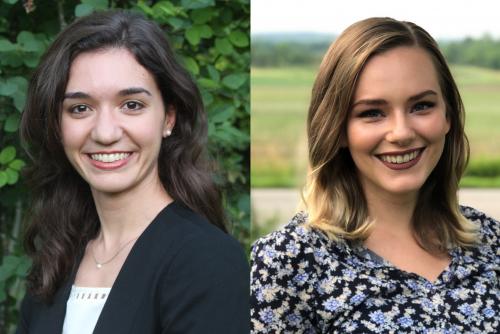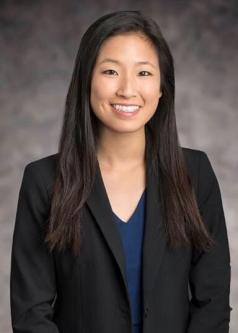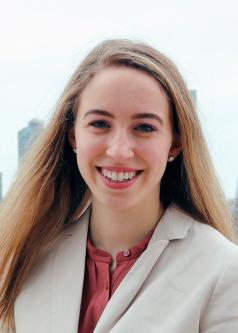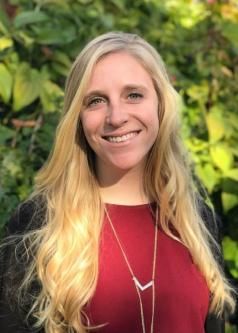Giving Back in a Historic Moment

Early in spring quarter, Alex Bright Braverman, ’22, and Angela Remus, ’22, researched and drafted an argument for federal public defenders in California—their first hands-on experience contributing to a motion in law school. The issue was broad: several cases had been stalled by restrictions and judicial emergencies resulting from the COVID-19 pandemic, and the lawyers wanted Bright Braverman and Remus to research whether a federal district court in California had violated the Speedy Trial Act when it granted an indefinite continuance in one of the cases.
“We weren't given one particular question to answer,” said Remus, who worked remotely as part of a pro bono project she and Bright Braverman had been referred to by their Criminal Procedure II professor, Alison Siegler. “We were told: this is the problem; what can we say about it?”
The students were given so much freedom to pose questions and craft arguments that they wondered, briefly, if the attorneys knew they were first-year law students. (At one point, Bright Braverman referred to Remus as a “fellow 1L” in an email, just to make sure it was clear.) The attorneys, of course, knew they were students. What’s more, Bright Braverman and Remus were better equipped than they thought to contribute substantive work—even as 1Ls.
“After one of the first big research pushes that we'd done, Angela and I were both wondering if we were on the right track, and if this was what they were hoping to receive,” Bright Braverman said. “And then we got an email from one of the assistant public defenders that said, ‘I like this, I'm going to put it in the motion.’ And we were thinking, ‘Okay, we just wrote something that's going in an actual motion.’ That’s incredible—to learn that something is happening from the work we did that's going to have a tangible effect on someone’s life.”
As the pandemic created a heightened need for legal aid for indigent clients and made in-person services riskier, dozens of Law School students volunteered to help, contributing many hours of virtual pro bono work, even as they navigated remote learning and other complexities themselves.
Some, like Bright Braverman and Remus, were first-year students in Professor Siegler’s class. She connected about 20 1Ls with opportunities to help federal public defenders across the country address legal issues raised by the pandemic. Others responded to opportunities posted by Pro Bono and Public Interest Coordinator Chelsea Dobleman or listed in a document compiled and circulated by Caitlan Sussman, ’22.
The work filled a range of needs, both pandemic-related and not. Students worked on release requests for COVID-19-vulnerable immigrants in detention centers, gave “Know your Rights” presentations through Illinois Legal Aid Online, checked in on clients in the Center for Disability and Elder Law, and much more.
“Seeing the many ways in which students have stepped up and engaged in pro bono service during the pandemic has been incredibly inspiring,” said Dobleman, noting that students raised an already high bar with their commitment to public service. “Not only are they gaining invaluable hands-on experience and applying what they’ve learned in the classroom to real-life legal issues—they’re giving back in a time when it is most crucial to help the underserved.”
Connecting Students with Public Defenders
On the first day of Siegler’s Criminal Procedure II class, after she discussed the impact COVID-19 was having on indigent clients charged with crimes, a handful of students expressed an interest in working directly on behalf of these individuals. During the second class, Siegler made an announcement: if any students wanted to get involved, they should send her an email right away—it wasn’t long before she had 20 volunteers signed up to help, fully one third of the 61-student class.
“I was just floored by the interest and the fact that they wanted to give of themselves and give up their time in this way, especially considering all the challenges that they're going through,” said Siegler, who is also the founder and director of the Law School’s Federal Criminal Justice Clinic. “Here we are in our very first week of Zoom distance learning, and they are volunteering to take on additional work to help indigent clients facing a terrible situation. I was really impressed and heartened.”
Sielger worked to connect students with federal public defenders around the country, as well as a couple of nonprofits working on prison and sentencing reform. Liaising directly with the attorneys, students worked in various capacities, including researching prison practices and facilities, gathering and organizing relevant medical data, and compiling information on trends in compassionate release decisions. For many of them, it was their first time doing hands-on legal work.
“They're writing motions, they're writing parts of motions, they're watching the research that they do go into actual motions and briefs that are being filed,” said Siegler, who later learned that some of the students’ pro bono work would lead to full-time summer employment. “They're really being given a significant role in a lot of these cases. It’s thrilling to learn about everything they’ve been able to do so far.”
Working with the nonprofit organization Compassionate Release Clearinghouse, George Colligan, ’22, helped create a directory of the most recent medical literature about COVID-19 for pro bono attorneys writing compassionate release motions. Hoping to provide these attorneys with scientific support and help them better understand their clients’ risk factors, Colligan combed through the rapidly changing and growing research on the virus. When he first emailed Siegler expressing an interest in getting involved, he had no idea where he’d be placed or what he would end up doing—he just knew he wanted to help.
“I was feeling immensely privileged to be holed up in my apartment, very safe from exposure,” Colligan said. “I just felt like this was such a historic moment and I wanted to be involved in the worldwide effort to make it better.”
Reading previously successful compassionate release motions, Colligan saw how the data he was gathering could benefit the lawyers working on these cases.
“It helped me imagine that my research efforts might contribute to positive outcomes for real people,” Colligan said, adding that “it connects the time on the internet with real people and their cases.”
Assisting a federal public defender in the Southern District of Illinois, Jennifer Chang, ’22, took the first stab at drafting a motion for compassionate release. After rounds of edits and communicating with the public defender via email, that motion was filed in early May—and they filed two more motions later that month. Being able to contribute to such a critical issue has been one of the most meaningful experiences of her 1L year, Chang said.
“In this pandemic, I feel like a lot of people have been feeling really helpless, myself included,” she said. “But then we're presented with this really unique opportunity to apply the tools and skills that we've been learning this year to real cases and help in any way we can. It’s been empowering to realize that even as 1Ls, we have the ability to engage in these efforts and try to be useful.”
Remote Opportunities for Every Student
Not long after the Stay at Home order began, Caitlan Sussman made it a priority to spread the word about virtual pro bono opportunities to her classmates. She created a living document outlining local, national, and international remote pro bono work, as well as UChicago initiatives and other ways students could get involved virtually during the pandemic, such as donating to various nonprofits.
“Having been involved in the Pro Bono Board, the Law Students Association, and the Impact Initiative Student Organization, I realized that in this time particularly, we do need to give back to our community,” Sussman said. “That’s why I decided to create this document. There’s so much potential that all of us students have to offer, and I hope this document is one way to help us channel that potential and use it to benefit our community.”
What began as an individual initiative grew as Sussman sought input from the Pro Bono Board and the Law Students Association, and circulated the document among professors. Learning that many of her classmates were interested in getting involved virtually, she made a point to include as wide a variety of opportunities as possible. Sussman has engaged in some of these remote opportunities herself, including serving as a Community Navigator with Illinois Legal Aid Online and calling clients in the Center for Disability and Elder Law to see how they’re managing during the pandemic. She has also attended training sessions with Know Your IX, an organization that empowers students to end sexual violence in schools, so that she can help code and analyze Title IX cases over the summer.
“I think this crisis has really emphasized the fact that we're all interconnected,” Sussman said. “The fact that every one of us probably knows someone who is either directly or tangentially affected by this crisis is part of the reason why, particularly during this time, I think students are very driven to find these types of opportunities.”
Christy Crouse, ’21, also engaged in a variety of remote pro bono opportunities during spring quarter. In addition to working with Chicago’s South Side Red Clay Dance Academy to develop their theory of change and conducting Zoom interviews in Belgium and Spain with the International Human Rights Clinic above the required credit hours, Crouse helped the American Friends Service Committee (AFSC) write a release request for an individual in an immigrant detention center with medical conditions that would be exacerbated by COVID-19.
“Two weeks into virtual class I thought, ‘Wow, I feel very overwhelmed.’ But also I knew that a lot of the people that I care about and a lot of the communities I care about are really suffering,” said Crouse, who was president of the Immigration Law Society this past year. “And it was after a couple of weeks on the self-care side of things that I decided: I can't just sit here. I do really care about these people and I know they need help—especially people in detention. Knowing that I could do something to try to help someone get out and maybe survive because of that was really, really important to me.”
Working with an attorney from AFSC and a law student from CUNY School of Law, Crouse communicated with their client about conditions in the detention facility and gathered information from family members, many of whom were outside of the United States. Communicating with individuals across the country and abroad presented some challenges, but the opportunity also forged new connections that may not have occurred under different circumstances.
“I was working with a lawyer who was in Kentucky and another law student who was in New York—I don't think that would have happened if we weren't in this virtual COVID time. I think this has brought people together in a different way,” Crouse said. “To connect virtually with people in very different places, during the school year, and actually work together was super cool.”
Doing pro bono work in various capacities throughout spring quarter reminded Crouse that as a law student and future lawyer, she is in a unique position to help those who need it most, especially during the unprecedented circumstances of a pandemic.
“All of the work I've done this quarter that's been pro bono has meant so much to me and has been really memorable, because in some ways it’s the first really helpful legal work that I've gotten to do,” she said. “Especially anything related to COVID-19. The experience of helping someone who's trying to get out of a very dangerous situation was extremely rewarding. It just showed me that even the most minute legal skills can really go a long way, especially in a crisis.”




